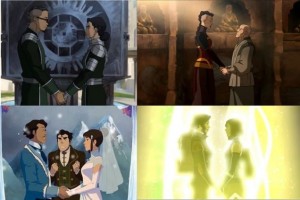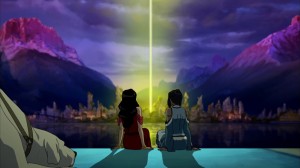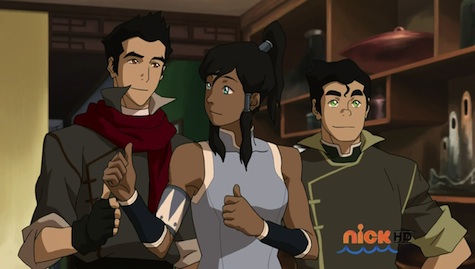Surprisingly exactly no one, the right-wing contingent of SFdom have taken exception to the Legend of Korra finale. Jim Hines takes this to task right over here. And on cue, the individual with whom he takes exception has brought a coterie of followers to come take reciprocal exception in Mr. Hines’ comment thread.
Caveat: Dara and I both appear in this comment thread, Dara more often than I do, as she takes potshots at several of the typical anti-queer propaganda points as well as the specific objections that the ending came out of left field. (Note: It didn’t, as Dara points out, with quite a few high-profile sources noting how the setup for Korrasami was not remotely subtle.)
Me, I’m mostly there to celebrate the ending of the show. But there is one thing in there that I want to call attention to, and that is this: how the gentleman with whom Mr. Hines is disagreeing pronounces in the comments that he “did not call for the extermination of people, but ideas.”
This would be chilling coming out of anyone. But it’s particularly egregious coming out of an SF writer.
Science fiction is, after all, the literature of ideas. None of us in the genre, writers or readers, should be calling for their extermination–even the ideas we might personally find reprehensible. It is as treacherous a slippery slope as slopes of that ilk get, because all too often, advocating the extermination of an idea leads to advocating the extermination of people who have them.
You need look no further than Uganda or Russia, where being queer of any stripe is essentially a death sentence. Even right here in the United States, queer people of all kinds continue to be the targets of prejudice, hate crimes, and bullying. Certain states have taken it upon themselves to pass laws legalizing discrimination against queers on religious grounds.
Nor is this limited to queer people. As the entire GamerGate debacle this year demonstrated, any woman who dares speak up loudly enough on the Internet risks getting doxxed, getting rape threats, and getting death threats. Just because she spoke up.
And all of this boils down to “I don’t like your ideas so I’m going to make your life as miserable as I possibly can for having them.”
For the record, I’d just like to say that even though there are indeed ideas I find personally reprehensible–like, say, the idea that queer people should be discriminated against, bullied, or punished with death, or the idea that women should be shouted down off the Internet with doxxing, rape threats, or death threats–I’m not going to tell someone they can’t have those ideas. I defend their right to have them.
But at the same time, I defend my right to call them utter horseshit. And if those ideas are put into actions that harm me and my loved ones or others like us, I defend my right to stand against them.
And here’s another idea I find reprehensible–the idea that Legend of Korra, by ending with two women walking off into the sunset spirit world together hand in hand, is somehow Harming the Children. As if anything that might demonstrate to queer children–and queer adults!–that yes, there are role models in fiction for them too might somehow make straight kids’ heads explode. It’s the same destructive logic I see in the assertions that boys wouldn’t possibly be interested in girls as lead characters, an assertion which, I recall, was launched against Korra for even existing as a character long before she became interested in Asami.
I’m pretty damn sure kids’ brains can take it.
As we move into 2015, I hope this year to come will bring us fewer of these particularly toxic beehives. I’m not betting on it. I’m not going to be pulling off the gloves any time soon, since I’m no fan of my hands getting stung.
But for once, it’s a pleasure and a delight to know that Mr. Konietzko and Mr. DiMartino have our backs. It makes me proud to be on Team Avatar.
Merry Korrasamimas to all!




